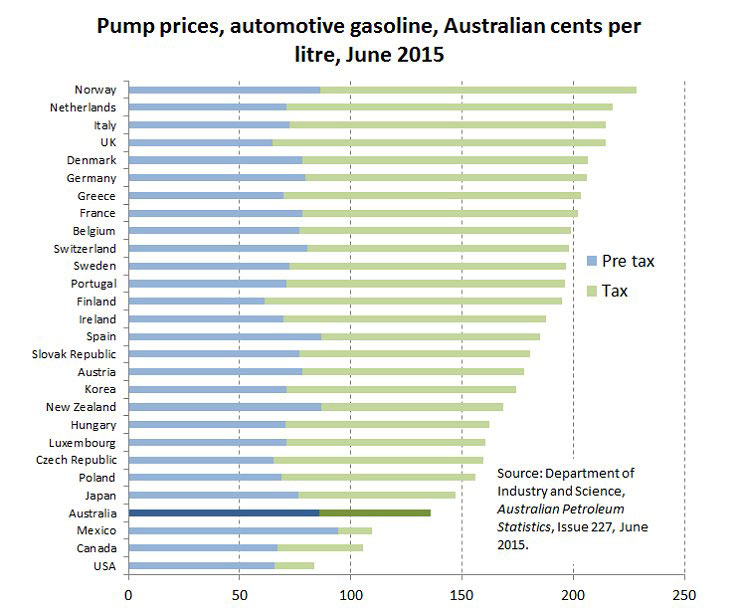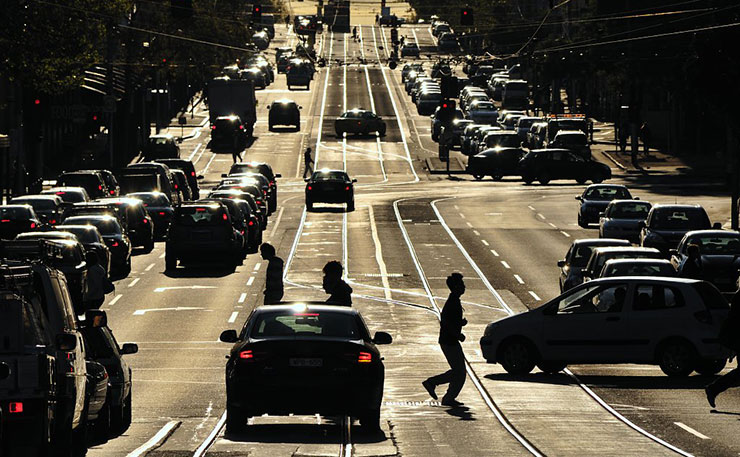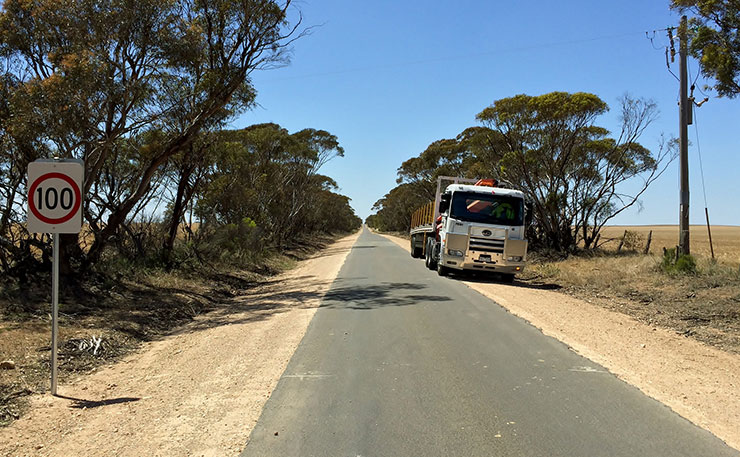ANALYSIS: Australia’s fuel tax system was designed when cars were a luxury. It desperately needs revising, writes Ian McAuley.
When Tony Abbott is under attack from so many quarters, it’s reasonable to recognise what may have been his only responsible economic initiative.
In spite of initial obstruction from Labor and the Greens, he re-introduced fuel excise indexation.
Because of falling wholesale fuel prices we have not noticed any price rise at the pump, but as from last year the excise on gasoline and diesel has risen from 38.1 cents to 39.5 cents a litre, and will go on rising every six months.
Until 2001, fuel excise had been indexed to the CPI, but that was when John Howard, ever committed to populism rather than responsible economics, abolished indexation. Had indexation been retained, excise would now be around 56 cents a litre, meaning gasoline and diesel would be about 18 cents more expensive (10 per cent more than the rise in excise because of the addition of GST).
An 18 cent price rise would most likely raise howls of protest, but Australians would still have some of world’s cheapest automotive fuel outside North America and the Middle East oil sheikdoms, as shown in the diagram below.

A common rationalisation for our low fuel prices is that we live on a continent with vast distances, but in reality most of our population is concentrated on a coastal strip stretching from Brisbane to Adelaide.
Our settlement pattern is not dissimilar to that of the Nordic countries, where fuel prices are around $2 a litre (AUD). For example the distance from the coastal city of Luleå in the north of Sweden to Malmö in the south is 1,500 km, and Norway has even longer distances between its main settlements.
Each cent of fuel excise raises about $400 million a year, meaning an 18 cent rise would raise around $7 billion a year in public revenue.
With wholesale prices about as low as we can expect them to go, this would be a good time to increase the excise before Australians go out and buy more Land Cruisers and other high fuel consumption vehicles.
In fact, Australia’s vehicle fleet already has poor fuel efficiency in comparison with other countries. One reason we have been tardy in tightening consumption and emission standards is that we have used lax standards as de facto support for our local car manufacturing industry, but once this industry closes next year there will be strong pressure for us to lift our standards.
A rise in excise, however, should be no more than a stopgap measure. In the longer term we need to revisit the whole question of road transport taxes.
At present there is a rough balance between motor vehicle taxes (state and federal) and expenditure on roads. In 2013-14, the latest year for which data is available, governments collected $24 billion in motor vehicle taxes ($15 billion Commonwealth, $9 billion state) while spending $25 billion on roads.
At first sight that seems reasonable, because it approximates a “user pays” system. Because these taxes relate to roads, miners and farmers have a valid point when they defend concessions for vehicles that are not used on publicly-financed roads. (exemptions for these industries cost public revenue around $3 billion a year).
Similarly users of fuels for non-road use, including for trains and backup power generation, legitimately claim they should not have to pay fuel taxes.
But those taxes carry two economic distortions, one in equity and the other in economic efficiency.

The problem in equity is that about a third of motor vehicle taxes are in the form of fixed charges – mainly registration fees – which usually come bundled with compulsory third-party insurance. They are charges on vehicle ownership, not vehicle use.
That may have made sense 90 years ago when car ownership was a luxury, but it makes no sense now when almost anyone in or seeking employment needs a car – the only significant exceptions being those who can afford to live close to good public transport and who have 9-5 type employment in urban centres.
Financial counsellors report that vehicle registration imposes significant stress on poor people, and many risk driving unregistered and uninsured cars. Shifting taxes from ownership to use makes good sense.
The problem in economic efficiency lies in the very fact that these taxes cover road expenditure, and nothing more. That means they do not cover the negative externalities associated with vehicle use, namely contribution to greenhouse gases (GHG), local pollution and congestion.
GHG pollution should be covered by a general carbon tax applying to all diesel and gasoline. That would encourage the uptake of electric cars, which, because of their significant battery capacity, can be a useful complement to renewable energy developments.
Unfortunately the electric truck is still some way off, and it is in freight transport where there is strong growth in fuel use. Car use has tended to plateau while truck use is still growing strongly, but there is scope for efficiency improvement.
That leaves local pollution and congestion costs. A general fuel tax would not be a fair or efficient means to cover such costs. Particulate and nitrous oxide pollution from diesel vehicles, while serious in cities, is hardly a concern in the country. Congestion is a cost in peak times (which is increasingly becoming a 7 am to 7 pm six-days-a-week phenomenon), but is not a cost imposed by a shiftworker who commutes at night time.
We have the technology to implement comprehensive road user charging, as recommended by the Henry Review. Road user charging could replace all existing excise and registration fees, and could incorporate costs for congestion and local pollution as well as road expenditure.
There is even a case for using some of the revenue so raised to support public transport and non-road private transport, particularly cycling, on the basis that these modes relieve pressure on roads.
Adequate road user charging would not only reduce congestion and local pollution, but would also provide a more efficient way to fund new road infrastructure than privatisation. Toll roads (in an otherwise “free” network) involve high costs to cover the private sector’s cost of capital, high transaction costs, and the incentive on drivers to rat-run to avoid tolls.

One impediment to an informed debate on transport taxation comes from those who categorically oppose any new road construction, often in the belief that stopping road development will somehow result in better public transport. Our cities need both roads and public transport, however, because they serve different purposes.
In cities, public transport carries people who have reasonably regular schedules, and who have (usually well-paid) employment in or near city centres. Roads carry freight (a point often overlooked by those who talk about “cars”), people who have multiple destinations, and people who must travel with their tools of trade.
European cities such as Zürich, which are often held up as models of wise transport planning, have good public transport, and they also have high capacity freeways circling the urban areas (there is something hypocritical about the well-off car-free person living in Edgecliff or Unley who complains about urban freeways but who expects tradespeople to travel from Campbelltown or Salisbury to fix their appliances and maintain their houses).
Outside the cities we also need to invest in roads, not only to upgrade the deadly Pacific, Bruce and Dukes Highways, but also in remote regions, where bad roads impose huge costs on Aboriginal and non-Aboriginal people living in the outback.
Unfortunately, we don’t have the political space in which to consider such a significant re-design of our transport taxes, even though it could satisfy both equity and environmental requirements, while providing a better source of funds for road construction than privatisation.
Where’s that tax debate we were promised?
Donate To New Matilda
New Matilda is a small, independent media outlet. We survive through reader contributions, and never losing a lawsuit. If you got something from this article, giving something back helps us to continue speaking truth to power. Every little bit counts.





